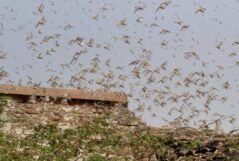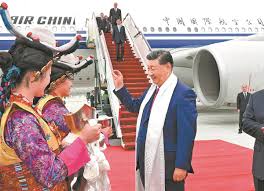Pakistan overcomes locust with Iron Brother China’s help

Gwadar Pro
Islamabad: Pakistan has cleared the Khyber Pakhtunkhwa, Sindh and Punjab provinces of the locust attack with the help of Iron Brother China, the National Locust Control Center (NLCC) said.
The NLCC said that anti-locust operation had been completed in 1,131,865 hectares across the affected districts and eliminated the pest completely from the three provinces.
China helped with anti-locust sprays, equipment and expert advice as locust attacked Pakistan, destroying crops all over the country.
The NLCC said it carried out an anti-pest operation over 40 hectares of District Lasbella of Balochistan during last 24 hours in order to eliminate it completely from the country.
The joint teams of the Ministry of National Food Security and Research, provincial agriculture departments and the Pakistan Army were conducting a comprehensive survey and control operation against the locusts in effected districts and succeeded to minimize its threat from 61 districts to only one districts, said an official statement.
The joint teams formed to combat the desert locust attacks had also completed survey of about 209,775 hectares of affected areas.
No locust have been reported from Khyber Pakhtunkhwa, Sindh and Punjab, however locust was present in only one district of Balochistan -Lasbella.
The anti-locust survey and control operations were also in full progress as NLCC conducting anti-locust operation and survey of affected areas in order to eliminate the pest from the country completely to avoid any threat to agriculture sector, said the statement.
The NLCC has completed anti-locust survey of 209,775 hectares during last 24 hours and carried out anti locust operation in one affected districts of Balochistan, it added.
Pakistan averted the worst-ever swarms of desert locusts with prompt and massive assistance from China.
Pakistan deployed drones, helicopters, hundreds of vehicles and thousands of agriculture workers since declaring an emergency in February 2020.
Locust swarms first entered Pakistan in June 2019 from neighbouring Iran and quickly devastated large areas of agricultural land across southwestern districts, ravaging cotton, wheat, maize and other crops.
The damage prompted Pakistan, a country of 220 million people, to miss its production target for wheat by about 2 million tonnes, forcing the government to import the grain for the first time in almost 10 years.
The low yields have pushed up the price of wheat and other foodgrains, pushing overall inflation to almost 10 percent in September piling political pressure on the government.
China, Pakistan’s close ally and neighbour, had donated drones, thousands of tonnes of pesticides and technical expertise to help the country tackle the crisis.



